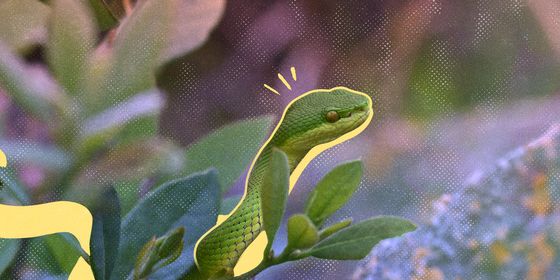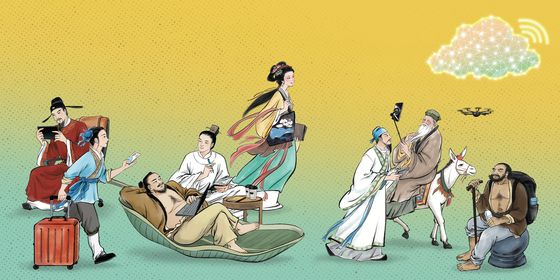Sayings and stories about fools in Chinese history
Happy April Fool’s Day!
Those who fell for pranks today might feel a little stupid; In fact, the Chinese term for April Fool’s Day is quite literally “愚人节,” or “Fool’s Festival.” No one likes to be labeled an idiot, but a little foolishness has brought color and laughter to the world for centuries.
Cautionary tales about idiots litter ancient Chinese history, some of which so tickled their contemporary audiences that their stupidity has been immortalized into commonly used chengyu:
守株待兔 Stand by a tree stump waiting for a hare
During the Warring States period (475 – 221 BCE), famous Legalist scholar Han Fei recounted a story in his text Han Fei Zi: There was a peasant in the state of Song, who once saw a hare dash into a tree stump in his field and die. He put down his hoe, and went to pick up the dead hare. From then on, the peasant never did any farming again, and waited by the tree every day for another hare to smash into the tree stump. But no more hares ever showed up.
The story birthed a chengyu which is now used to mock people who hold onto unrealistic daydreams, or hope to gain without doing any work.
You need to seek opportunities actively. Waiting by a tree for a hare won’t bring you a new job.
Nǐ děi zhǔdòng xúnzhǎo jīhuì, shǒuzhū-dàitù kě zhǎobudo xīn gōngzuò.
你得主动寻找机会,守株待兔可找不到新工作。
揠苗助长 Pull shoots to help them grow
Mencius’s eponymous text may be a tome of philosophical argument, but it was not without humor. Another story from the state of Song appeared there: A Song farmer was anxious about how slowly his crops were growing, so he decided to make them taller by pulling them upward one by one. After a whole day’s hard work, the farmer was very satisfied, and said to his son: “I am so tired today, but I helped the shoots grow.” The son rushed to the field, only to find that the shoots had withered.
The chengyu that derived from this story refers to doing harm by being over-enthusiastic.
I think giving so much homework to these students is like pulling shoots to make them grow. It may be not helpful for their studies.
Wǒ juéde gěi xuéshēng liú zhème duō zuòyè shì yàmiáo-zhùzhǎng, duì tāmen de xuéxí wèibì yǒu bāngzhù.
我觉得给学生留这么多作业是揠苗助长, 对他们的学习未必有帮助。
掩耳盗铃 Plug one’s own ears to steal a bell
This story was recorded in Master Lü’s Spring and Autumn Annals: In the Spring and Autumn period, the Fan clan of the Jin state was wiped out by their enemies, and their house was left deserted. A thief slipped into their yard in an attempt to steal valuables. There was a huge bell made of bronze there, which was very expensive, but too heavy to be moved. The only way to take it away was by smashing it into pieces, and moving these pieces one by one. The thief found a hammer, and hit the bell, but instead of shattering, it made a loud clanging sound. Worried that the sound would attract people’s attention, the thief plugged his own ears with some cloth, and felt safe smashing up the bell in silence. Unsurprisingly, everyone heard him, and he was caught.
The idiom that originates from this story means to bury one’s head in the sand, and can be used to describe any type of self-deception.
Eating health products while continuing to smoke is like stealing a bell with your own ears plugged.
Nǐ chī zhème duō bǎojiànpǐn bǎohù nǐ de fèi què bú jièyān, zhè wúyì yú yǎn’ěr-dàolíng.
你吃这么多保健品保护你的肺却不戒烟,这无异于掩耳盗铃。
画蛇添足 Draw a snake and add feet to it
Liu Xiang, a historian during the Han dynasty (206 BCE – 220 CE) recorded an amusing story of a painter in the Intrigues of the Warring States: A native of the State of Chu one day decided to share a pot of wine with his retainers. But there was not enough wine to go around. So one retainer suggested that they all draw snakes on the ground and the one who finished first would win the entire pot. Everyone agreed and the competition began. One retainer was very good at drawing, and easily finished before everyone else. He decided to continue drawing, however, gloating: “I can add feet to it.” Since snakes don’t have feet, the boastful man lost the competition.
This chengyu is similar to “gilding the lily,” describing unnecessary embellishments.
Don’t put any more decorations on that birthday cake, it’s just adding feet to a snake.
Bié zài gěi shēngrì dàngāo jiā shénme zhuāngshi le, huì huàshé-tiānzú de.
别再给生日蛋糕加什么装饰了,会画蛇添足的。












